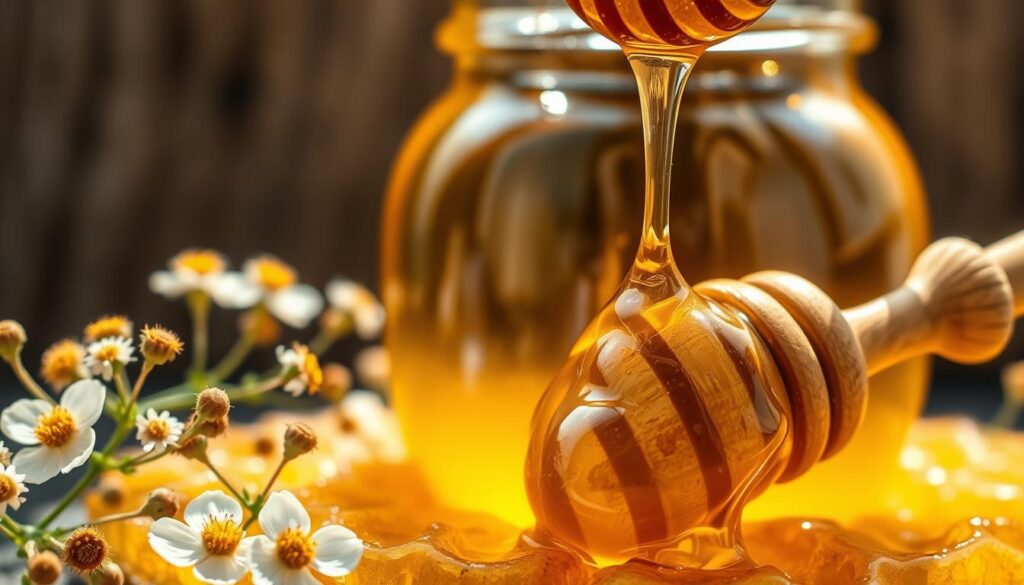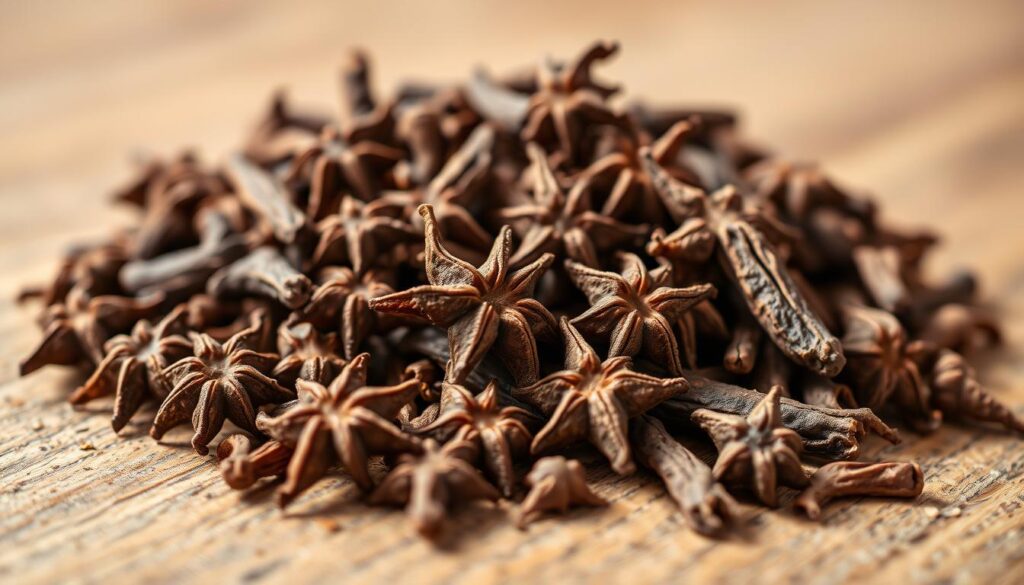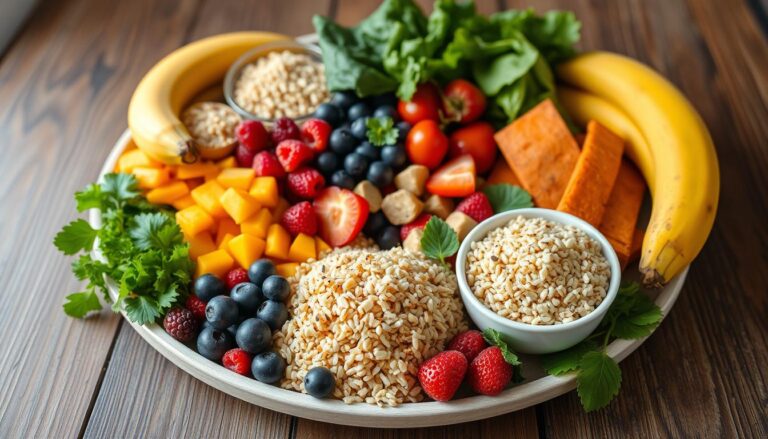Antibioticresistance is a big problem with over 2 million Americans getting sick from drug resistant bacteria each year.
This article looks at the 7 most powerful natural antibacterial remedies, herbal antimicrobials, and plant-based antibiotics. These nature’s germ fighters have antibacterial, anti-inflammatory antimicrobial and antioxidant properties. They could change how we fight infections and improve our organic health.
What if the solution to antibiotic resistant superbugs is in your kitchen or garden? Get ready to be amazed by the strong natural antibiotics that might solve this big medical problem.
Key Takeaways
- Natural compounds like garlic honey, and ginger show promise as effective antimicrobial agents.
- Research is investigating plant-based alternatives to combat the rise of antibiotic resistant bacteria.
- Herbal remedies such as Echinacea and Goldenseal have long been used for their immune boosting and infection-fighting properties.
- Spices like clove and oregano exhibit potent antibacterial effects offering new avenues for natural antibiotic development.
- Consulting healthcare professionals is crucial when using natural antibiotics to ensure safe and effective usage.
Introduction to Natural Antibiotics
In today’s world we’re looking for new ways to fight germs. Natural antibacterial remedies herbal antimicrobials, and plant-based antibiotics are being seen as nature’s germ fighters.
These antibacterial cleaning anti-inflammatory, and antimicrobial compounds from plants and herbs might be just as good as traditional antibiotics. They could help us fight germs without making bacteria resistant to drugs.
Importance of Natural Alternatives to Conventional Antibiotics
Too much use of synthetic antibiotics has created antibiotic-resistant superbugs. This is a big problem for our health.
Natural antibacterial remedies and herbal antimicrobials might be a better choice. They could help us fight germs without making bacteria resistant. Plus they often have antioxidants and other good stuff that helps our health and immune system.
Overview of the 7 Most Powerful Natural Antibiotics
This article will look at the seven most powerful natural antibiotics. We’ll talk about garlic honey ginger echinacea goldenseal clove, and oregano. Each of these herbal antimicrobials and plant based antibiotics has special antibacterial anti-inflammatory, and antimicrobial powers. They can help keep us healthy and well.
Garlic: A Versatile Antimicrobial Agent
Garlic is a key ingredient in many dishes and is known for its health benefits. It contains compounds like allicin ajoenes, and allyl sulfides. These have strong antibacterial and antimicrobial properties.
Active Compounds in Garlic with Antibacterial Properties
Garlic’s power comes from its many bioactive compounds. Allicin is released when garlic is crushed and has been studied for its antibacterial effects. Ajoenes and allyl sulfides also show antimicrobial actions against many bacteria, including multi-drug resistant ones.
Potential Applications and Evidence for Garlic as an Antibiotic
New research points to garlic as a possible antibiotic source. Fresh garlic extract can stop many bacteria from growing including multidrug-resistant ones. Its effects are sometimes as strong as traditional antibiotics like gentamicin.
Garlic’s mix with some antibiotics can work even better. This makes garlic a strong contender among natural antibiotics. Its effectiveness against multi-drug resistant bacteria is a big plus.

Garlic is reported as a potential therapeutic food in managing COVID-19 infection.
Honey Nature’s Sweet Antimicrobial
Honey, made by honeybees, has been valued for its healing powers for ages. It’s not just tasty but also fights off harmful microbes, acting as a natural antibiotic.
Honey’s strength against microbes comes from its special mix of hydrogen peroxide methylglyoxal, and other compounds. These ingredients are strong against many bacteria including Staphylococcus aureus Helicobacter pylori, and Pseudomonas aeruginosa.
Honey’s high osmolarity and acidity also play a big role. These qualities make it hard for microbes to grow. Its pH between 3.2 and 4.5 also stops harmful bacteria from multiplying.
Honey has been found to be effective against multidrug-resistant bacteria causing human infections like Proteus species, Serratia marcescens Vibrio cholerae S. aureus E. coli and Pseudomonas aeruginosa.
Honey also helps wounds heal by fighting off microbes. Its antimicrobial compounds keep the wound clean helping it heal naturally.

Read more: The Natural Antibiotic You Should Know About
Honey is a powerful tool against drug resistant bacteria. Its ability to heal wounds and fight microbes makes it a great natural antibiotic. Using honey as part of your health care with a doctor’s advice can help manage infections and improve your health.
Ginger A Potent Antimicrobial Spice
The scientific world sees ginger as a natural antibiotic. It has antimicrobial antioxidant anti inflammatory, and anticoagulant properties. Ginger can stop many bacteria like Streptococcus mutans and Staphylococcus species. This makes it a strong natural antimicrobial agent.
Antibacterial and Anti-inflammatory Properties of Ginger
Ginger has oils and pungent parts. The main parts are sesquiterpene hydrocarbons and phenolic compounds like gingerol and shogaol. These parts have many health benefits, including fighting inflammation and microbes.
The antioxidant parts of ginger fight free radicals. Its anti-inflammatory parts reduce inflammation by stopping certain proteins.
Potential Uses of Ginger as a Natural Antibiotic
Ginger fights many pathogens, including Streptococcus mutans and Staphylococcus species. It’s a natural option against bacterial infections.
Ginger also fights fungi and worms. Its antimicrobial and anti-inflammatory effects make it useful for many health issues.

Echinacea An Herbal Powerhouse for Immune Support
Echinacea is a plant from North America. It has been used for centuries to fight infections and heal wounds. New studies show it might also have strong antibacterial and antiviral effects. This makes it a great natural choice for boosting the immune system and fighting off respiratory diseases.
Antibacterial Effects of Echinacea on Respiratory Bacteria
Research shows echinacea can fight off many respiratory pathogens. These include Streptococcus pneumoniae Haemophilus influenzae, and Klebsiella pneumoniae. These bacteria cause many respiratory infections like bronchitis and pneumonia.
Echinacea might help prevent and treat these infections reducing the need for antibiotics and their risks.
Echinacea also has antiviral properties. This could help it fight off viruses that cause colds and flu. Taking echinacea early in a cold or flu might make symptoms less severe and shorten the illness.
| Echinacea Benefits | Evidence |
|---|---|
| Reduces the odds of developing a cold by 58% | Clinical trials |
| Shortens the duration of a cold by 1 to 4 days | Clinical trials |
| Exhibits antibacterial activity against respiratory pathogens | Research studies |
| Demonstrates antiviral potential | Research studies |
Echinacea has a long history of use and is backed by scientific studies. It’s a natural way to support the immune system and fight respiratory diseases. Always talk to a healthcare professional before using echinacea especially if you have health conditions or take medications.

Read more: Immune Cells Regenerate While Fasting
What are the 7 most powerful natural antibiotics?
Goldensead A Traditional Herbal Antibiotic
Goldenseal is a traditional herbal remedy. It’s often taken as tea or capsules. Some studies suggest it might have antimicrobial anticancer, and immune stimulant properties. But, there’s not enough proof to confirm its health benefits.
Potential Benefits and Limitations of Goldenseal
Research shows goldenseal might fight bacteria and reduce inflammation. It contains berberine, which stops some bacteria like Staphylococcus aureus and Escherichia coli from growing. It might also boost the immune system.
But the science on goldenseal’s effectiveness is still weak. More studies are needed to prove its safety and benefits. The quality of goldenseal products can also vary. It’s important to buy from trusted sources. Always talk to a doctor before trying goldenseal or any natural remedy.

Goldenseal is a traditional herbal remedy that is often consumed in the form of tea or capsules.
| Potential Benefits of Goldenseal | Limitations of Goldenseal |
|---|---|
|
|
Goldenseal has a long history and some promising research. But its effectiveness as a natural antibiotic is still unclear. It’s wise to use caution with goldenseal and other natural remedies. Always check with a healthcare professional before using them.
Clove A Spice with Antibacterial Potential
Cloves come from the clove tree and are a favorite spice in cooking. They also have antibacterial properties. Studies show that clove essential oil and extract can fight Staphylococcus aureus a harmful bacterium.
One study found that clove water extract can stop S. aureus with just 2 mg/mL. Clove powder also works well against many bacteria with effects starting at 1.0% w/v.
Clove essential oil is the strongest against bacteria beating other oils. It works against both Gram-positive and Gram-negative bacteria. It’s especially good against Morganella morganii with a MIC of 0.13% v/v.
Clove extract is also top against Listeria monocytogenes with a MIC of 0.24 mg/mL. Clove water extract is best against Clostridium botulinum with MICs from 0.1% to 0.2%.
These results show clove and its extracts have strong antibacterial effects. They could be a natural choice against antibiotic-resistant bacteria like S. aureus.

Oregano A Versatile Herb with Antimicrobial Properties
Oregano is more than just a tasty herb in Mediterranean dishes. It has strong antimicrobial properties. This makes it a possible natural antibiotic.
Active Compounds in Oregano Responsible for Antibacterial Effects
Carvacrol and thymol are key in oregano’s fight against bacteria. These compounds are strong against many pathogens. They even work against Streptococcus mutans a major cause of tooth decay.
Potential Applications of Oregano as a Natural Antibiotic
Studies are looking at oregano oil as a natural antibiotic. It shows promise against antibiotic-resistant bacteria like MRSA. It could also help keep food safe by stopping harmful bacteria from growing.
Oregano is not just good against bacteria. It also fights viruses and reduces inflammation. This makes it a great herb for keeping us healthy. As more research comes out oregano might become a key ally in our battle against germs.
Precautions and Safety Considerations
Natural antibiotics might seem like a good choice, but caution is key. The amount of active ingredients can differ a lot between brands. This can lead to risks like the dangers of too much colloidal silver.
Some natural antibiotics, like garlic, can also increase the risk of bleeding. They might interact with other medicines you’re taking. Always talk to a healthcare professional before using them especially if you have health issues or take prescription drugs.
Interactions and Side Effects of Natural Antibiotics
- Herbal medicines and supplements aren’t checked by the FDA like drugs are. This means their quality and safety can vary a lot.
- Natural antimicrobials can have dangerous interactions with certain medications if taken in large quantities or over an extended period.
- Using natural antibiotics too much can lead to antibiotic-resistant “superbugs,” just like prescription antibiotics.
When to Consult a Healthcare Professional
- If symptoms don’t get better after a few days of using natural antimicrobials you should see a doctor.
- Natural remedies aren’t for everyone, especially pregnant or breastfeeding women or those on blood thinners.
- Don’t treat yourself with herbal medication, as the quality and safety can vary a lot.
Understanding the interactions and side effects of natural antibiotics is important. Knowing when to see a healthcare professional helps you use these alternatives safely and wisely.
| Statistic | Value |
|---|---|
| Prescription Antibiotics Dispensed in the U.S. 2021 | 211 million prescriptions 636 per 1,000 people |
| Hospitalized Patients Receiving Antibiotics | Approximately 1 in 3 people |
| Most Commonly Prescribed Antibiotic Classes | 1. Penicillins, 2. Cephalosporins, 3. Macrolides |
Conclusion
This article has explored natural antibiotics from plants. Garlic, honey, ginger, echinacea, goldenseal, clove, and oregano show great promise. They could be alternatives to traditional antibiotics helping fight antibiotic resistance.
Scientists are studying these natural remedies more closely. They hope to create new treatments for bacterial infections. This could help solve the problem of antibiotic resistance.
Using natural antibiotics in healthcare could be a big step forward. It could help protect our health and find new ways to fight infections. By looking to nature, we might find solutions to the antibiotic resistance crisis.





